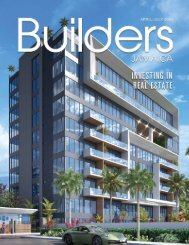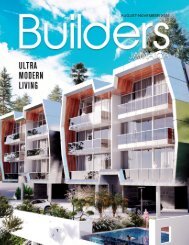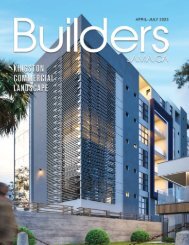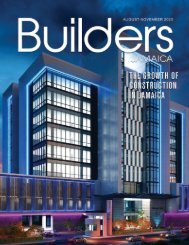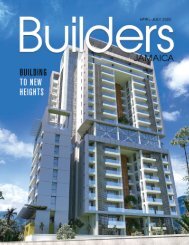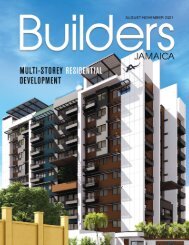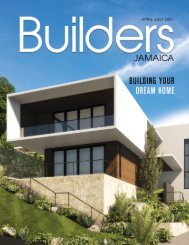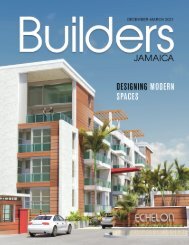Builders Jamaica December - March 2022
Builders Jamaica is a B2B publication focused on the latest developments within the construction industry. The editorial will be distinct in the way it conveys information on architectural trends, interior and exterior décor, the latest building technologies and projects across Jamaica. Builders Jamaica is designed to be informative and educational. We will make it easy for the reader and consumer to choose from different products and services whenever planning, developing or renovating.
Builders Jamaica is a B2B publication focused on the latest developments within the construction industry. The editorial will be distinct in the way it conveys information on architectural trends, interior and exterior décor, the latest building technologies and projects across Jamaica. Builders Jamaica is designed to be informative and educational. We will make it easy for the reader and consumer to choose from different products and services whenever planning, developing or renovating.
You also want an ePaper? Increase the reach of your titles
YUMPU automatically turns print PDFs into web optimized ePapers that Google loves.
safety & security<br />
of efficiency, a second guard can be brought in during<br />
critical hours (rush hour, for instance), enabling one<br />
to respond to calls while the other covers the post.<br />
Patrol Guards<br />
intelligently serve much more than 200 dwelling<br />
units. Beyond this number, a doorman's ability to<br />
distinguish easily between tenants and intruders<br />
breaks down,” which can lead to security lapses.<br />
A solution may be to have a dedicated tenants<br />
entrance and a separate one for visitors, each with<br />
their own security officer. Most modern complexes<br />
utilise electronic access for residents, so the doormen<br />
would only need to screen and monitor visitors.<br />
Stationary Guards<br />
Stationary guards are assigned to specific locations,<br />
such as a lobby, a location between two points of<br />
access, or a centrally located guard house. Their basic<br />
function is to deter anyone who “doesn’t belong”<br />
on the premises. Per the NCHSS, this may include<br />
“enforcing a code of acceptable behavior within the<br />
confines of the complex,” screening entrants “when<br />
their appearance is different from that of the typical<br />
resident,” and responding to emergencies. They are<br />
generally uniformed and may or may not be armed.<br />
If the guard is armed, he or she has the capacity to<br />
apprehend an intruder, which serves as a stronger<br />
deterrent than a typical doorman or unarmed personnel.<br />
A stationary guard may also be utilised in monitoring<br />
a complex’s closed-circuit television (CCTV) system.<br />
This is most effective if the complex's borders and<br />
points of access are secured. The guard can control<br />
all access to the premises using electrical dooropening<br />
switches and an intercom system. This<br />
protects several places through the services of one<br />
man. However, loss of efficiency is the trade-off.<br />
If the officer is stationed in a centrally located<br />
guard house in a development spread over several<br />
blocks or in a housing scheme rather than a single<br />
apartment tower, telephone service or other means<br />
of communication must be installed so he/she has<br />
response capability, if the need arises. To prevent loss<br />
Patrol guards, as the name suggests, move around the<br />
property. They may be assigned to specific routes or<br />
patrol freely. They’re used to cover large areas which<br />
cannot be monitored from a single vantage point. They’re<br />
also expected to respond to emergencies and calls.<br />
Patrol guards are best utilised in low-density or<br />
mixed-housing developments with numerous<br />
pathways and entrances instead of a doorman<br />
or stationary guard. They should be in uniform<br />
and encouraged to patrol openly and frequently.<br />
Reporting Systems<br />
Whether you use a doorman/lobby guard, stationary<br />
guard, or patrolling guard, it’s crucial to have a reporting<br />
system in place for any breaches, incidents, or crimes.<br />
Since these security personnel generally don’t have the<br />
capacity to make arrests, they should have a clear line<br />
of communication with the nearest police station in the<br />
event a situation arises that requires law enforcement.<br />
There should also be a clear line of communication<br />
between the tenants and security personnel and/<br />
or the development’s management if they take note<br />
of any sketchy activities that may not immediately<br />
get the guards’ attention. For example, if a visitor<br />
starts harassing a resident, or if it turns out a resident<br />
is the one involved in less-than-honest activities.<br />
There may even be cases where a security officer<br />
is involved or is negligent on the job, in which the<br />
residents wouldn’t feel safe reporting to another<br />
guard. Such incidents or even minor complaints should<br />
be addressed by the development’s management,<br />
and where necessary, the police brought in.<br />
Despite the presence of security personnel, tenants<br />
should be encouraged to report any suspicious<br />
matters, make recommendations if they believe<br />
improvements are needed, and also form or<br />
participate in tenant patrols or neighbourhood<br />
watches. Their vigilance is important as they have<br />
the most to lose in the event of a dangerous breach.<br />
53




